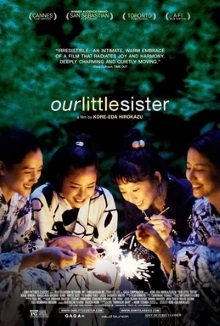
I picked this up from the usual lists of notable films since it was aired at some of the world’s most prestigious film festivals and thought it was fairly serious Japanese family drama. However it turned out to be a very light watch, being an adaptation of a manga. In fact, despite being a live-action film that it feel so much like a Japanese anime that I suspected this was the case.
Sachi, Yoshino and Chika are three sisters in their twenties who live on their own. One day they receive news that their father who they have not seen for fifteen years has passed away. We gather that he left their mother at that time, but his second wife then died and he died while being married to a third wife. At the funeral, they meet 14 year old Suzu, the daughter of the second wife. She turns out to be the one who has been taking care of their ailing father as the third wife seems quite helpless and unreliable. On a whim, Sachi invites her to come live with them and she accepts. Even as each of them grapples with various minor problems with Suzu in particular feeling guilty their father left the mother of the other three for her own mother, they get along splendidly and it is evident that this is happiest that Suzu has been in a long time. There is a moment of tension when the mother of the three elder sisters visits them, having since set up a new life for herself elsewhere, and suggests that they sell the old house. Still this is a pleasant film with no sharp conflicts and everything ends well.
As I’ve mentioned, while this is a live-action film, every part of it positively oozes anime. The scenery and camera angles, the dialogue and relationships, even set-pieces like Suzu wearing a kimono to the summer festival, riding a bicycle under a canopy of sakura trees, how she gushes with delight every time she tries a new food. These are all the familiar beats and tropes of slice-of-life manga. While this could easily fall into cloying sentimentality, director Hirokazu Kore-eda is fortunately adroit enough to balance out the lightness with moments of more adult drama and hints of maturity so that it doesn’t get annoying. The actresses are all very attractive and competent, with distinct enough personalities that they are all interesting. The result is a film that is easy on the eyes and feels so effortless to watch that it’s hard to imagine anyone disliking it. That too is very much like animated films in general.
One aspect of the film that I especially appreciated is its portrayal of everyday Japanese life. While the family arrangement depicted here is decidedly unconventional, their actual lifestyles seem to be stereotypically Japanese at least in the modern era, which makes it a fascinating watch. Of course this is an idealized depiction and so not quite realistic but I liked seeing the routines of life in a traditional wooden Japanese house such as when the sisters bond with each other by helping to replace the paper walls or even when they rush their morning routines to get to work or to school. It’s rather like a tour of a traditional house complete with details like how they store their homemade plum wine under the floorboards, that the family altar is tucked into a cupboard and even the sizes and furnishings of typical rooms. It was also illuminating to see how schoolgirls apparently play soccer in the same team with the boys, how Yoshino drinks plenty of alcohol and has flings with boyfriends younger than her and that’s fine, and many other aspects of Japanese society.
Our Little Sister is too breezy and too sweet to be considered as a serious film. As my wife notes, it determinedly avoids judging any character as being truly bad and takes a forgiving attitude towards their missteps while avoiding any truly damning confrontations. Still, just as there’s nothing wrong with indulging in a pleasant animated film every once in a while, there’s no shame in being thoroughly charmed by this one. This makes it an easy recommendation and the fact that it feels so much like an anime is a cool quirk in its favor as well.
One thought on “Our Little Sister (2015)”